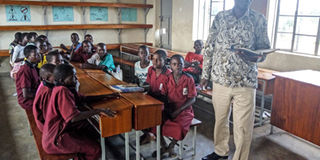School forcefully sends pupils home for meals

Talk. Mr Ismail Mulindwa, the director of basic education in the Ministry of Education and Sports, speaks to pupils of Kibenge Memorial Primary School in Namutumba District while monitoring Uganda Teacher and School Effectiveness Project (UTSEP) last week. PHOTOS BY PHILIP WAFULA
A primary school in Namutumba District has resorted to forcefully sending its pupils home during lunchtime, saying it does not have the resources to feed them.
Mr Peter Kibenge, the headmaster of Kibenge Memorial Primary School, a government-aided school in Namboote Village, Nsinze Sub-county, said most parents and guardians don’t feed their children, leaving them hungry until 3pm.
“Since they don’t want to go home because their parents are always in the fields, we have had no option other than to send them back to their defiant parents,” he said.
According to Mr Kibenge, every pupil is supposed to contribute five kilogrammes of maize per term to cater for his or her porridge intake. However, he said some parents have decided to remain ‘adamant’.
Earlier, when this reporter visited the school, Primary Four, Five and Six pupils had been forcefully sent home, though some remained loitering around the compound.
Mr Ismail Mulindwa, the director of basic education in the Ministry of Education and Sports, who was monitoring Uganda Teacher and School Effectiveness Project (UTSEP) in Namutumba and Bugiri districts last week, advised parents to feed their children at school.
“A parent who is not providing you with meals is not your parent. Government is providing textbooks, buildings and it is the parents’ responsibility to provide meals,” he said.
The Education minister, Ms Janet Museveni, while speaking at the launch of Phase II of the Literacy Achievement and Retention Activities (LARA) at Muriisa Primary School in Ntungamo District in 2016, advised parents to buy food flasks for their school-going children so that they can eat food when it is hot.
“What I don’t agree with is packing lunch in banana leaves and children eat it when it is cold as lunch. You can buy a small flask for packing food,” she stressed.
Mr Kibenge added that because parents do not want to provide their children with scholastic materials including uniform, pupils are forced to dress in whatever clothes they want.
This, he said, has made them, especially those in Primary Six and Seven ‘look old’ and become vulnerable to rapists and defilers.
Other challenges
Mr Kibenge also said the school that has been in existence since 2008, has challenges of less staff.
“We need another building for streaming the classes to categorise slow learners from quick ones. This will encourage competition from pupils,” he said.
Government, through UTSEP has constructed three classroom blocks at Buwanga Primary School and two classroom blocks at Kibenge Memorial Primary School.
Mr Mulindwa noted that this has increased the pupils enrolment and created a conducive learning environment in the beneficiary schools.
“The teachers are smart and don’t look miserable like the case before,” he said.
2016 MEMO
An October 31, 2016 memo signed by the then permanent secretary of the Education ministry, Dr Rose Nassali Lukwago, expressed concern over poor performance and increasing number of pupils dropping out of schools due to lack of midday meals at schools, among other factors.
‘‘It has therefore been decided by government that all stakeholders, most especially the parents be reminded of their cardinal role to ensure learners are fed at school,’’ the memo reads in part.
However, the policy is not being implemented in most of the schools which Daily Monitor visited last week in Kibaale, Kakumiro and Kagadi districts.
Parents have three options of providing meals for their children at school under the policy: paying money to the school administration to buy food for pupils, packing food for their children or directly providing food items such as maize and beans to the school administration.




